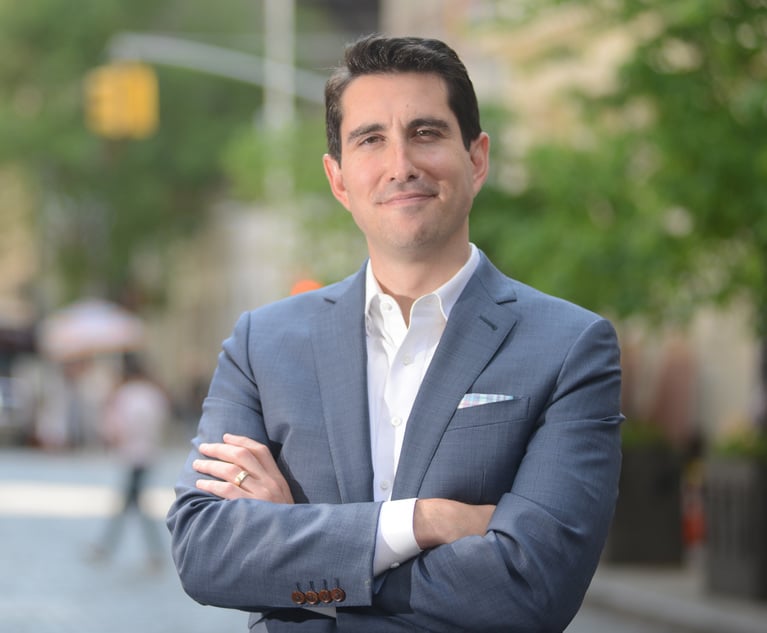Palo Alto Networks Case Provides Lessons on Protecting Confidential Records and Preventing Insider Trading
In-house leaders typically don't serve as gatekeepers for a firm's sensitive data, but they can play an important role when it comes to advising companies and employees about the management of confidential records.
December 18, 2019 at 03:35 PM
4 minute read
The original version of this story was published on Corporate Counsel
 (Photo: ESB Professional/Shutterstock.com)
(Photo: ESB Professional/Shutterstock.com)
The Securities and Exchange Commission's announcement of insider trading charges against a former information technology administrator for cybersecurity company Palo Alto Networks Inc. raises questions about what, if anything, in-house leaders can do to prevent similar incidents.
In the Palo Alto Networks case, the IT staffer in question, Janardhan Nellore, allegedly accessed "highly confidential" financial records with his employee credentials, then shared the insider information with four friends. Nellore pleaded guilty Wednesday to conspiracy to commit securities fraud before a federal judge in San Jose in a related criminal case.
Nellore and his pals, who used the code word "baby" in texts and emails to refer to Palo Alto Networks' stock, made more than $7 million through the insider trading scheme before they were caught, according to a federal complaint filed Tuesday in California.
Nellore was arrested in May at the airport as he and his family tried to board a one-way flight to India. He was fired earlier this year.
"There will always be people at a company with administrative access to email, etc., unless you have a totally closed system, which is pretty unrealistic and impractical," Ed Ryan, former general counsel of Marriott International Inc., wrote Wednesday in an email.
Companies need to ensure that sensitive data is shared on a need-to-know basis and that "anyone who potentially has access, authorized or not—and this would include IT—be aware that it's a terminable offense to access it (and they know that bread crumbs are always out there) and a criminal offense to use it," Ryan added.
Corporate legal department adviser Jason Winmill, a managing partner at Agropoint in Boston, echoed Ryan in noting that in-house leaders typically have an advisory role when it comes to determining which documents are confidential but do not generally act as gatekeepers.
"In my experience, the general counsel would be responsible for communicating to the other stakeholders what their legal obligations are to keep things confidential. And then perhaps doing follow-up spot checking to make sure the legal obligations are being met," he said.
Mark Smolik, general counsel and chief compliance officer for DHL Supply Chain Americas, noted that many large companies, especially those with a global presence, have data protection officers, who sometimes work in the legal department but are more often found in the IT department.
Smolik added that "more and more of this function [oversight of confidential records] is landing under the umbrella of the IT teams. Legal departments are there to support the IT departments and data protection officers and interpret the laws and rules and regulations that apply."
Of course, most companies that are worried about the misuse of their confidential data have employees sign nondisclosure and noncompete agreements. But Susan Hackett, CEO of law practice management consulting firm Legal Executive Leadership, said corporate counsel are increasingly questioning the benefit of such agreements.
"Quite honestly, you don't give yourself any further protections at law for having put those documents in place. If you violate a nondisclosure agreement, you're going to get prosecuted if we catch you. But the fact that you have a nondisclosure agreement doesn't mean I have any greater or fewer opportunities to sue your or stop you," she added.
The agreements serve a purpose by putting employees on notice, Hackett said, but "in terms of compliance responsibilities, I'm not sure that you can prevent someone who has criminal intent from exercising that criminal intent."
She added, "If there was any kind of best practice, it would be to help employees who may be ignorant of these issues realize what they should or shouldn't talk about."
Read More:
This content has been archived. It is available through our partners, LexisNexis® and Bloomberg Law.
To view this content, please continue to their sites.
Not a Lexis Subscriber?
Subscribe Now
Not a Bloomberg Law Subscriber?
Subscribe Now
NOT FOR REPRINT
© 2025 ALM Global, LLC, All Rights Reserved. Request academic re-use from www.copyright.com. All other uses, submit a request to [email protected]. For more information visit Asset & Logo Licensing.
You Might Like
View All
Kraken’s Chief Legal Officer Exits, Eyes Role in Trump Administration
3 minute read

Collectible Maker Funko Wins Motion to Dismiss Securities Class Action

How Tony West Used Transparency to Reform Uber's Toxic Culture
Trending Stories
- 1Chief Judge Joins Panel Exploring Causes for Public's Eroding Faith in NY Legal System
- 2Pogo Stick Maker Wants Financing Company to Pay $20M After Bailing Out Client
- 3Goldman Sachs Secures Dismissal of Celebrity Manager's Lawsuit Over Failed Deal
- 4Trump Moves to Withdraw Applications to Halt Now-Completed Sentencing
- 5Trump's RTO Mandate May Have Some Gov't Lawyers Polishing Their Resumes
Who Got The Work
J. Brugh Lower of Gibbons has entered an appearance for industrial equipment supplier Devco Corporation in a pending trademark infringement lawsuit. The suit, accusing the defendant of selling knock-off Graco products, was filed Dec. 18 in New Jersey District Court by Rivkin Radler on behalf of Graco Inc. and Graco Minnesota. The case, assigned to U.S. District Judge Zahid N. Quraishi, is 3:24-cv-11294, Graco Inc. et al v. Devco Corporation.
Who Got The Work
Rebecca Maller-Stein and Kent A. Yalowitz of Arnold & Porter Kaye Scholer have entered their appearances for Hanaco Venture Capital and its executives, Lior Prosor and David Frankel, in a pending securities lawsuit. The action, filed on Dec. 24 in New York Southern District Court by Zell, Aron & Co. on behalf of Goldeneye Advisors, accuses the defendants of negligently and fraudulently managing the plaintiff's $1 million investment. The case, assigned to U.S. District Judge Vernon S. Broderick, is 1:24-cv-09918, Goldeneye Advisors, LLC v. Hanaco Venture Capital, Ltd. et al.
Who Got The Work
Attorneys from A&O Shearman has stepped in as defense counsel for Toronto-Dominion Bank and other defendants in a pending securities class action. The suit, filed Dec. 11 in New York Southern District Court by Bleichmar Fonti & Auld, accuses the defendants of concealing the bank's 'pervasive' deficiencies in regards to its compliance with the Bank Secrecy Act and the quality of its anti-money laundering controls. The case, assigned to U.S. District Judge Arun Subramanian, is 1:24-cv-09445, Gonzalez v. The Toronto-Dominion Bank et al.
Who Got The Work
Crown Castle International, a Pennsylvania company providing shared communications infrastructure, has turned to Luke D. Wolf of Gordon Rees Scully Mansukhani to fend off a pending breach-of-contract lawsuit. The court action, filed Nov. 25 in Michigan Eastern District Court by Hooper Hathaway PC on behalf of The Town Residences LLC, accuses Crown Castle of failing to transfer approximately $30,000 in utility payments from T-Mobile in breach of a roof-top lease and assignment agreement. The case, assigned to U.S. District Judge Susan K. Declercq, is 2:24-cv-13131, The Town Residences LLC v. T-Mobile US, Inc. et al.
Who Got The Work
Wilfred P. Coronato and Daniel M. Schwartz of McCarter & English have stepped in as defense counsel to Electrolux Home Products Inc. in a pending product liability lawsuit. The court action, filed Nov. 26 in New York Eastern District Court by Poulos Lopiccolo PC and Nagel Rice LLP on behalf of David Stern, alleges that the defendant's refrigerators’ drawers and shelving repeatedly break and fall apart within months after purchase. The case, assigned to U.S. District Judge Joan M. Azrack, is 2:24-cv-08204, Stern v. Electrolux Home Products, Inc.
Featured Firms
Law Offices of Gary Martin Hays & Associates, P.C.
(470) 294-1674
Law Offices of Mark E. Salomone
(857) 444-6468
Smith & Hassler
(713) 739-1250






